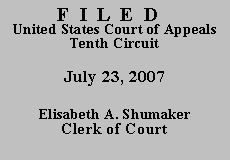

| MARSHALL A. TILLMAN, |
|
| v. | |
| JOSEPH D. JOHNSON, |
"To state a claim under section 1983, a plaintiff must allege the violation of a right secured by the Constitution and laws of the United States, and must show that the alleged deprivation was committed by a person acting under color of state law." West v. Atkins, 487 U.S. 42, 48 (1988); Northington v. Jackson, 973 F.2d 1518, 1523 (10th Cir. 1992). Because Mr. Tillman is proceeding pro se this Court accords a liberal construction to his claim. See Haines v. Kerner, 404 U.S. 519, 520 (1972) (per curiam).
Mr. Tillman names his former criminal defense attorney Mr. Johnson as the sole defendant in this action. Mr. Tillman accuses Mr. Johnson of violating his right to a speedy trial, lying to him about various aspects of the proceedings, and providing ineffective assistance.
The purpose of 42 U.S.C. § 1983 is "to protect the people from unconstitutional action under color of state law, 'whether that action be executive, legislative, or judicial.'" Mitchum v. Foster, 407 U.S. 225, 242 (1972) (citing Ex Parte Virginia, 100 U.S. 339, 346 (1879)). Private actors do not fall under this umbrella. Because counsel for a defendant is acting in the interest of his client--rather than the state--"[t]he conduct of an attorney acting in his professional capacity while representing his client does not constitute action under color of state law for the purposes of § 1983." Beedle v. Wilson, 422 F.3d 1059, 1073 (10th Cir. 2005) (internal quotation marks omitted). We therefore agree with the district court that Mr. Tillman has filed a claim which fails to state a claim upon which relief may be granted.
The judgment of the United States District Court for the District of Kansas is AFFIRMED.
Entered for the Court,
Michael W. McConnell
Circuit Judge
*.After examining the briefs and appellate record, this panel has determined unanimously that oral argument would not materially assist in the determination of this appeal. See Fed. R. App. P. 34(a)(2); 10th Cir. R. 34.1(G). This case is therefore submitted without oral argument. This order and judgment is not binding precedent, except under the doctrines of law of the case, res judicata, and collateral estoppel. It may be cited, however, for its persuasive value consistent with Fed. R. App. P. 32.1 and 10th Cir. R. 32.1.